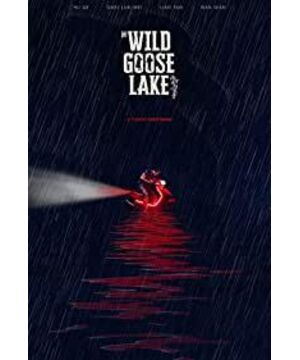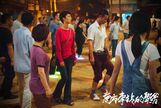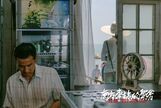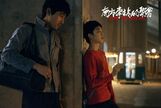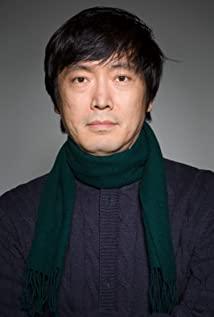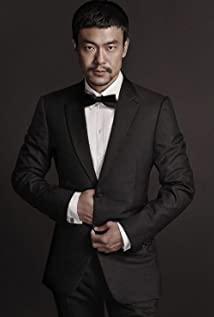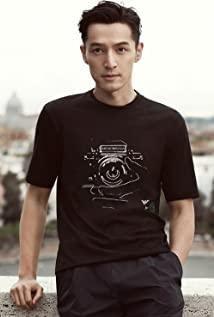In "The Party at Southern Station", we see a lot of Diao Yinan's "movie fanaticism": "M is the Murderer" (1931), "The Third Man" (1949) and other classic noir films such as "Shadow", "Desperate Driving" (2011) with its urban tones, Quentin-esque gore shots…
Behind the "cinephile spirit" is the sense of form and personal style of "The Gathering at Southern Station". In fact, Diao Yinan has always been a director who attaches great importance to the sense of formality of the film. His four feature films so far have all been "metaphysical". Of course, Diao Yinan's sense of form is very different from that of Zhang Yimou. Zhang Yimou's sense of form is both wide-ranging and delicate, while Diao Yinan's sense of form is both restrained and forbearing and brutal.
In a sense, Diao Yinan is a criminal psychologist as a director, and every film he directs is related to crime. "Uniform" (2003) tells the story of a tailor posing as a police officer. "Identity play" is his way of escaping his cramped living space and also helps him establish a "fictional" love. "Night Train" tells the stories of passengers on a "night train" carrying "despair" and "loneliness", a female bailiff, a death row prisoner and the husband of a death row prisoner, law, love and hatred, intertwined, collided and embraced. Under the guise of suspense and reasoning, "Fireworks in the Day" (2014) is the hidden secret of the times and the suppression of human nature, and it is also the common PTSD behind the extreme crime. Compared with the above three works, the crime elements in "The Party at South Station" are much richer, and the various dramatic conflicts are also "exploded" like never before.
I once said that Diao Yinan is a "uniform control". His first three works, his debut "Uniform", needless to say, the heroine of "Night Train" is a bailiff, and the hero of "Fireworks in the Day" is a policeman. Put them together It's literally a "uniform trilogy". "The Party at South Station" still has the police, and in large numbers, but they are no longer the protagonists of the film. Instead, the criminals have become the protagonists of the film.
"The Party at South Station" presents the group portraits of criminals in a "metaphysical" author style, while the entire story constructs a "metaphysical ecology of the criminal world".
At the beginning of the film, it is the "party at the South Station", a "party" between a fugitive and a swimmer with an ambiguous identity. Behind this "gathering", a criminal world gradually unfolded and a certain "ecology" was formed. Like all ecosystems, the "ecology of the criminal world" has its own rules.
"Criminal World Ecology" Rule 1: Compete for turf.
The law of the jungle in the criminal world is more obvious and cruel than the general human society. The motorcycle theft gang led by Lao Ma, of course, cannot avoid competing for territory. Zhou Zenong's qualifications are older, and his "team" has always occupied the best "site". The "teams" of Maoyan and Maoer are emerging forces, and they have long coveted Zhou Zenong's "site". Shortly after Zhou Zenong was released from prison, the power of the "team" declined somewhat. Naturally, Maoyan and Maoer wanted to take this opportunity to change the "division of territory". So, Huang Mao shot and injured the cat's ear. In the confrontation between the two "teams", Lao Ma proposed a "plan" to resolve the dispute: come to a "theft of motorcycles"!
Rule 2 of "The Ecology of the Criminal World": The Fatal Effects of Incidents.
In an ecosystem, certain accidental events can lead to fundamental changes in the entire ecosystem. When Maoyan and Huangmao were racing, all they wanted was to "win", not to kill each other. Maoyan used an unconventional method to intercept Huangmao, the forklift! In the night, Huang Mao's vision was limited, and the speed of the car was too fast, and he was killed by a forklift. Once Huang Mao died, the rules of the game of "Theft of Motorcycle Games" would inevitably change. As a result, Maoyan continued to chase and kill Zhou Zenong. Zhou Zenong accidentally killed the policeman during Ye Yu's escape. The motorcycle theft gang was originally a relatively stable ecology with certain rules, but Huang Mao's death and Zhou Zenong's manslaughter will inevitably introduce the deadly nemesis of the entire ecosystem - the police - into the ecosystem.
"Criminal World Ecology" Rule Three: Life has a price.
For every individual life, life is priceless. But in a criminal world, life has a price. Buy murder to kill, you can make a price. To hunt down fugitives, he can also make a price. Killing a police officer is a serious crime, and Zhou Zenong's "price" is not low, 300,000! Everyone wants to do this deal, but Zhou Zenong wants to choose the buyer himself. As a man who has hardly assumed the responsibility of a husband and father, he wants to leave the 300,000 yuan to his wife.
Rule 4 of "The Ecology of the Criminal World": People die for money.
The fleeing Zhou Zenong is actually a "dead man". He is no longer an important member of the entire criminal world ecology, but has become a "prey" in the entire criminal world ecology. Everyone wants to get this "prey", or a piece of it. And in the "hunting" process, more people died.
"Criminal World Ecology" Rule 5: Eradicating the Weeds and Fighting Back.
Maoyan and Maoer's "hunting" of Zhou Zenong is not only for money, but also to eradicate the roots, because Zhou Zenong "knows too much". Similarly, the old horse is not moral and joins the "hunting" of Zhou Zenong for the same reason. As the biggest "victim" of the "accidental incident", Zhou Zenong naturally wanted revenge, but at this time he was too busy to take care of himself and was unable to implement it. When Maoyan, Mao Er and Lao Ma lured and "hunted" Zhou Zenong, they underestimated the lethality of a desperate man who "puts it to death and survives". When Zhou Zenong's life was hanging by a thread, he started a Jedi counterattack and launched a heartwarming "revenge"!
Rule 6 of "The Ecology of the Criminal World": No one is truly credible.
In the criminal world, morality is the most important "rule". Once morality collapses, the ecology of the entire criminal world will fall apart. The criminal world in the film is of course moral, and Zhou Zenong's two close "little brothers" are very "loyal". But more often than not, no one is truly credible. Zhou Zenong's wife "betrayed" him, his good brother Huahua "betrayed" him, his "boss" Lao Ma "betrayed" him, and the swimmer who admired him also "betrayed" him... In the face of threats and money , morality is often penniless.
Rule 7 of "The Ecology of the Criminal World": Natural enemies.
The natural enemy of criminals is the police. The police are naturally the terminator of the "criminal world ecology". Zhou Zenong must die! Zhou Zenong also wanted to die! After Liu Ai'ai reported the case, Zhou Zenong continued to resist arrest and fled, but judging from the route of his escape and the form of his shooting, he did not want to hurt others anymore, he just wanted to be shot "reasonably". After Zhou Zenong's death, the police found that his gun was out of ammunition, and the police said he was "crazy". Yes, if he is not "crazy" and surrenders, he can die another day. He is "crazy" in order to beg for death.
The above "rules" constitute Diao Yinan's "criminal world ecology". At the same time, these "rules" also solve the ultimate problem of "justice and evil", allowing the film to pass the trial smoothly. The "criminal world ecology" in "The Gathering at Southern Station" is "metaphysical", but those dark and mottled shadows and those unintentional gags are very down-to-earth, and this is the secret of the author's film " Advanced".
View more about The Wild Goose Lake reviews


